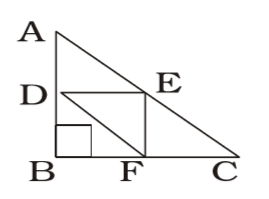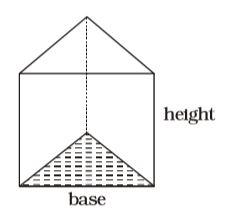Mensuration
- What is the area of a triangle having perimeter 32cm, one side 11cm and difference of other two sides 5cm?
-
View Hint View Answer Discuss in Forum
Using Rule 2 and 3,
Let the sides of triangle be a, b and c respectively.
∴ 2s = a + b + c = 32
⇒ 11 + b + c = 32
⇒ b + c = 32 – 11 = 21 .....(i)
and b – c = 5 ......(ii)
By adding equations (i) and (ii)
2b = 26 ⇒ b = 13
⇒ c = 13 – 5 = 8
Now, 2s = 32 ⇒ s = 16 a = 11, b = 13, c = 8
∴ Area of triangle
= √s(s - a)(s - b)(s - c)
= √16(16 - 11)(16 - 13)(16 - 8)
= √16 × 5 × 3 × 8
= 8√30 sq. cm.Correct Option: A
Using Rule 2 and 3,
Let the sides of triangle be a, b and c respectively.
∴ 2s = a + b + c = 32
⇒ 11 + b + c = 32
⇒ b + c = 32 – 11 = 21 .....(i)
and b – c = 5 ......(ii)
By adding equations (i) and (ii)
2b = 26 ⇒ b = 13
⇒ c = 13 – 5 = 8
Now, 2s = 32 ⇒ s = 16 a = 11, b = 13, c = 8
∴ Area of triangle
= √s(s - a)(s - b)(s - c)
= √16(16 - 11)(16 - 13)(16 - 8)
= √16 × 5 × 3 × 8
= 8√30 sq. cm.
- The sides of a triangle are 3 cm, 4 cm and 5 cm. The area (in cm²) of the triangle formed by joining the mid points of this triangle is :
-
View Hint View Answer Discuss in Forum
Using Rule 1,

3² + 4² = 5²
∆ ABC is a right angled triangle.∴ area ABC = 1 × AB × BC 2 = 1 × 3 × 4 = 6cm² 2
∴ Required Area of ∆ DEF∴ 1 × 6 = 3 sq.cm. 4 2 Correct Option: C
Using Rule 1,

3² + 4² = 5²
∆ ABC is a right angled triangle.∴ area ABC = 1 × AB × BC 2 = 1 × 3 × 4 = 6cm² 2
∴ Required Area of ∆ DEF∴ 1 × 6 = 3 sq.cm. 4 2
- The length of the diagonal of a square is ‘a’ cm. Which of the following represents the area of the square (in sq. cm.) ?
-
View Hint View Answer Discuss in Forum
Using Rule 10,
Side of square = Diagonal = a √2 √2
∴ Area = (Side)²= 
a 
² aq.cm. = a² sq.cm. √2 2 Correct Option: C
Using Rule 10,
Side of square = Diagonal = a √2 √2
∴ Area = (Side)²= 
a 
² aq.cm. = a² sq.cm. √2 2
- The base of a right prism is an equilateral triangle of side 8 cm and height of the prism is 10 cm. Then the volume of the prism is
-
View Hint View Answer Discuss in Forum
Area of the base = √3 × (side)² 4 
= √3 × 8 × 8 = 16√3 cm. 4
∴ Volume of prism = Area of base × height
= 16√3 × 10 = 160√3 cu. cmCorrect Option: B
Area of the base = √3 × (side)² 4 
= √3 × 8 × 8 = 16√3 cm. 4
∴ Volume of prism = Area of base × height
= 16√3 × 10 = 160√3 cu. cm
- A bicycle wheel has a diameter (including the tyre) of 56 cm. The number of times the wheel will rotate to cover a distance of 2.2 km is (Assume π = 22/7)
-
View Hint View Answer Discuss in Forum
Distance covered by wheel in 1 revolution = π × diameter
= 22 × 56 = 176 cm 7
Total distance = 2.2 km = (2.2 × 1000 × 100) cm = 220000 cm∴ Number of revolutions = 220000 = 1250 176 Correct Option: B
Distance covered by wheel in 1 revolution = π × diameter
= 22 × 56 = 176 cm 7
Total distance = 2.2 km = (2.2 × 1000 × 100) cm = 220000 cm∴ Number of revolutions = 220000 = 1250 176

